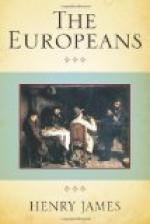“Only for a moment. I shall pull myself together again.”
“You had better not take it too hard. If you are bored, you need n’t be afraid to say so—to me at least.”
“You should n’t say such things as that,” the Baroness answered. “You should encourage me.”
“I admire your patience; that is encouraging.”
“You should n’t even say that. When you talk of my patience you are disloyal to your own people. Patience implies suffering; and what have I had to suffer?”
“Oh, not hunger, not unkindness, certainly,” said Acton, laughing. “Nevertheless, we all admire your patience.”
“You all detest me!” cried the Baroness, with a sudden vehemence, turning her back toward him.
“You make it hard,” said Acton, getting up, “for a man to say something tender to you.” This evening there was something particularly striking and touching about her; an unwonted softness and a look of suppressed emotion. He felt himself suddenly appreciating the fact that she had behaved very well. She had come to this quiet corner of the world under the weight of a cruel indignity, and she had been so gracefully, modestly thankful for the rest she found there. She had joined that simple circle over the way; she had mingled in its plain, provincial talk; she had shared its meagre and savorless pleasures. She had set herself a task, and she had rigidly performed it. She had conformed to the angular conditions of New England life, and she had had the tact and pluck to carry it off as if she liked them. Acton felt a more downright need than he had ever felt before to tell her that he admired her and that she struck him as a very superior woman. All along, hitherto, he had been on his guard with her; he had been cautious, observant, suspicious. But now a certain light tumult in his blood seemed to tell him that a finer degree of confidence in this charming woman would be its own reward. “We don’t detest you,” he went on. “I don’t know what you mean. At any rate, I speak for myself; I don’t know anything about the others. Very likely, you detest them for the dull life they make you lead. Really, it would give me a sort of pleasure to hear you say so.”
Eugenia had been looking at the door on the other side of the room; now she slowly turned her eyes toward Robert Acton. “What can be the motive,” she asked, “of a man like you—an honest man, a galant homme—in saying so base a thing as that?”
“Does it sound very base?” asked Acton, candidly. “I suppose it does, and I thank you for telling me so. Of course, I don’t mean it literally.”
The Baroness stood looking at him. “How do you mean it?” she asked.
This question was difficult to answer, and Acton, feeling the least bit foolish, walked to the open window and looked out. He stood there, thinking a moment, and then he turned back. “You know that document that you were to send to Germany,” he said. “You called it your ‘renunciation.’ Did you ever send it?”




